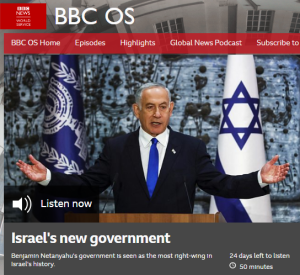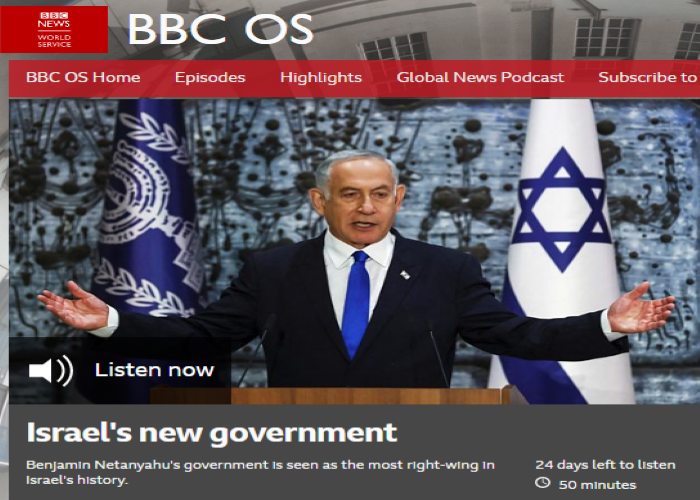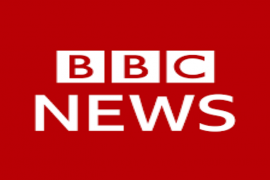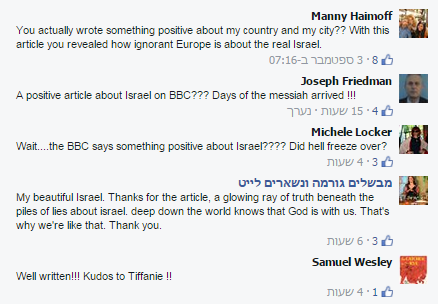Previously we discussed coverage of the December 21st announcement by Likud leader Netanyahu that he had come to agreements with his coalition partners to form a new government in the first hour of the December 22nd edition of the BBC World Service radio programme ‘OS’ (formerly known as ‘Outside Source’):
BBC WS RADIO AIRS PALESTINIAN DISINFORMATION IN ISRAEL GOVERNMENT ITEM
The second hour of that programme also had that topic as its lead item.
“A new government seen as the most right-wing in Israel’s history has been agreed, sealing Benjamin Netanyahu’s return to power. His coalition contains far-right parties, including one whose leader was once convicted of anti-Arab racism. Our correspondent gives us the latest on the story. We also hear the thoughts of Israelis and Palestinians on the new government.”
Using the same format as in the previous hour, presenter James Reynolds again discussed the topic with one of his BBC colleagues for almost twelve minutes (from 00:03 here) – this time the Jerusalem bureau’s Yolande Knell – and listeners heard interspersed recorded contributions from Israeli voters representing a variety of views as well as from one contributor who is not part of the electorate.
During the conversations between Reynolds and Knell, listeners heard superficial references to topics on which Knell did not bother to expand. For example:
Knell: “…flashpoint neighbourhoods of East Jerusalem such as Sheikh Jarrah where there are moves by Israeli settlers to try to take over Palestinian homes.”
That portrayal of course does not even come close to providing the BBC’s worldwide listeners with an accurate or impartial picture of the long-running property dispute in Sheikh Jarrah.
Knell: “…the flag march that takes place on Jerusalem Day each year. That’s when Israel celebrates the fact that it captured East Jerusalem in the 1967 Middle East war. It’s seen as very provocative to walk through Damascus Gate, the entrance to the Muslim quarter of the city.”
Listeners were not told why or by whom “it’s seen as very provocative” for Israeli Jews to walk on a particular public street in their capital city and the political background to that view went unmentioned.
Knell: “…the idea of a two-state solution. That’s the international formula for peace that still guides the United States and European governments and still backed by Palestinian leaders…”
The BBC has been promoting the claim that “Palestinian leaders” seek a two-state solution to the conflict since late 2016. However, as we have had cause to note in the past, that portrayal is inaccurate and misleading because it does not clarify to BBC audiences the repeated refusal of Palestinian Authority leaders to recognise Israel as the Jewish state: a necessary condition for fulfilment of the concept of “two states for two peoples”. That claim also of course conceals the fact that Hamas and additional Palestinian factions reject the two-state solution outright.
From 08:10 listeners heard the views of a woman from the Gaza Strip who not only is not an Israeli voter but clearly does not believe that this particular incoming Israeli government is – in contrast to the narrative promoted by Reynolds and his BBC colleagues – any different to previous ones.
Baker: “Hello, my name is Leanne Baker [phonetic]. I live in Gaza, Palestine. Now as a new Israeli government being formed by the lead of the prime minister of the most Right-wing Netanyahu, we Palestinians can only think of the dark days that we lived during several assaults over Gaza in the last 14 years that resulted in thousands and thousands of martyrs, of women and children, some who had big dreams that maybe today they could have been real. I also think of all the people that were injured and now their whole life has changed and have to carry on with a permanent illness. I recall I remember in particular the nights that me and my family thought were our last ones. That we will never see another morning. The election of a new government in Israel can be so dramatic as it will not only affect the lives of Israelis but millions of Palestinians as well. I mean why would a new government bring us peace or ease of life if all the previous governments couldn’t? When Palestinians hear the name Netanyahu, all they can think of more bombing, more blockade, travel bans and hardships. Even though we’re entering a new year now, we hope pretty much we’ll finally find peace and freedom that we look so hard for.”
As in the previous hour of the programme, Reynolds and his BBC colleague made no effort whatsoever to provide listeners with the information that would help put the chosen contributor’s talking points into context and perspective. Neither he nor Knell bothered to point out that “thousands and thousands” of women and children have not been killed during the rounds of conflict between Israel and Gaza Strip based terrorists over the past 14 years. Neither he nor Knell took the trouble to explain that the reason for the blockade on the Gaza Strip is because it is controlled by an internationally recognised terrorist organisation or that Israel withdrew from that territory over 17 years ago. The crucial context of Palestinian terrorism was not mentioned even once by either BBC journalist.
Reynolds: “Leanne there in the Gaza Strip; the strip of territory in which more than 2 million Palestinians live, many of them refugees. It’s not an independent state. Its borders are controlled by both Israel and Egypt. And Yolande, for those who don’t follow this conflict day to day, can you explain to our audience how an Israeli government would have an impact on the daily lives of Palestinians both in Gaza and also in the West Bank.”
Knell: “Well because of the occupation of the West Bank and the conditions that exist in Gaza which is kept under a blockade by both Israel and Egypt. They’re extremely vulnerable to Israeli policies basically. We’ve already had Palestinian leaders in the West Bank coming out saying that this is a racist and extremist government. And really anyone that was hoping for peace talks to kind of be renewed – they’ve been stalled since 2014 – there’s just no real chance of that with this government.”
While Knell was obviously quite happy to promote a description of Israel’s new government from PA officials such as Mohammed Shtayyeh and Hussain al-Sheikh, she of course refrained from informing listeners of the record of the Palestinian Authority on issues of racism and extremism. As in the previous hour of the programme, listeners were not informed where the PA and Hamas are located on the political map.
She also failed to clarify that negotiations “stalled” in 2014 because the Palestinian Authority/PLO effectively chose to end that round of talks by announcing ‘reconciliation’ with the Hamas terrorist organisation.
Once again we see that in its enthusiasm to report on Israel’s new government – repeatedly portrayed as “the most Right-wing in the country’s history” – BBC World Service radio was quite happy to uncritically promote context-free Palestinian talking points along with uninformative sound-bytes which do not serve its public purpose of providing “accurate and impartial news”.
Related Articles:
BBC WS RADIO AIRS PALESTINIAN DISINFORMATION IN ISRAEL GOVERNMENT ITEM





